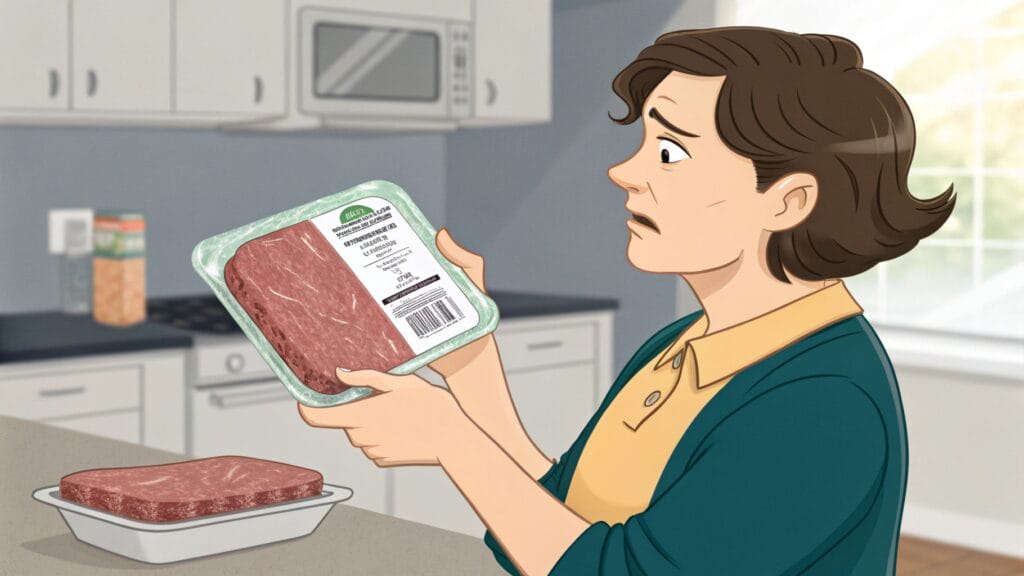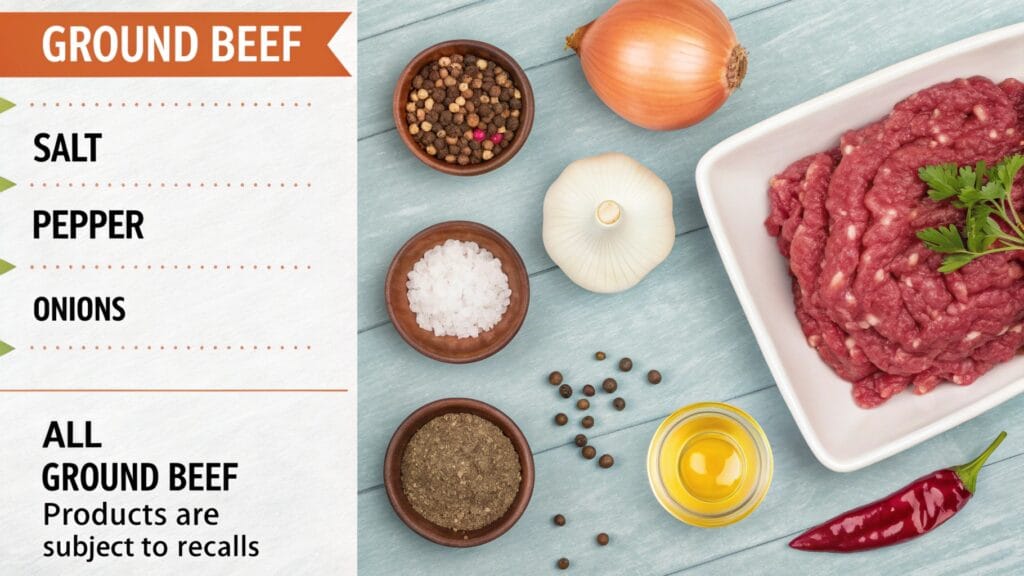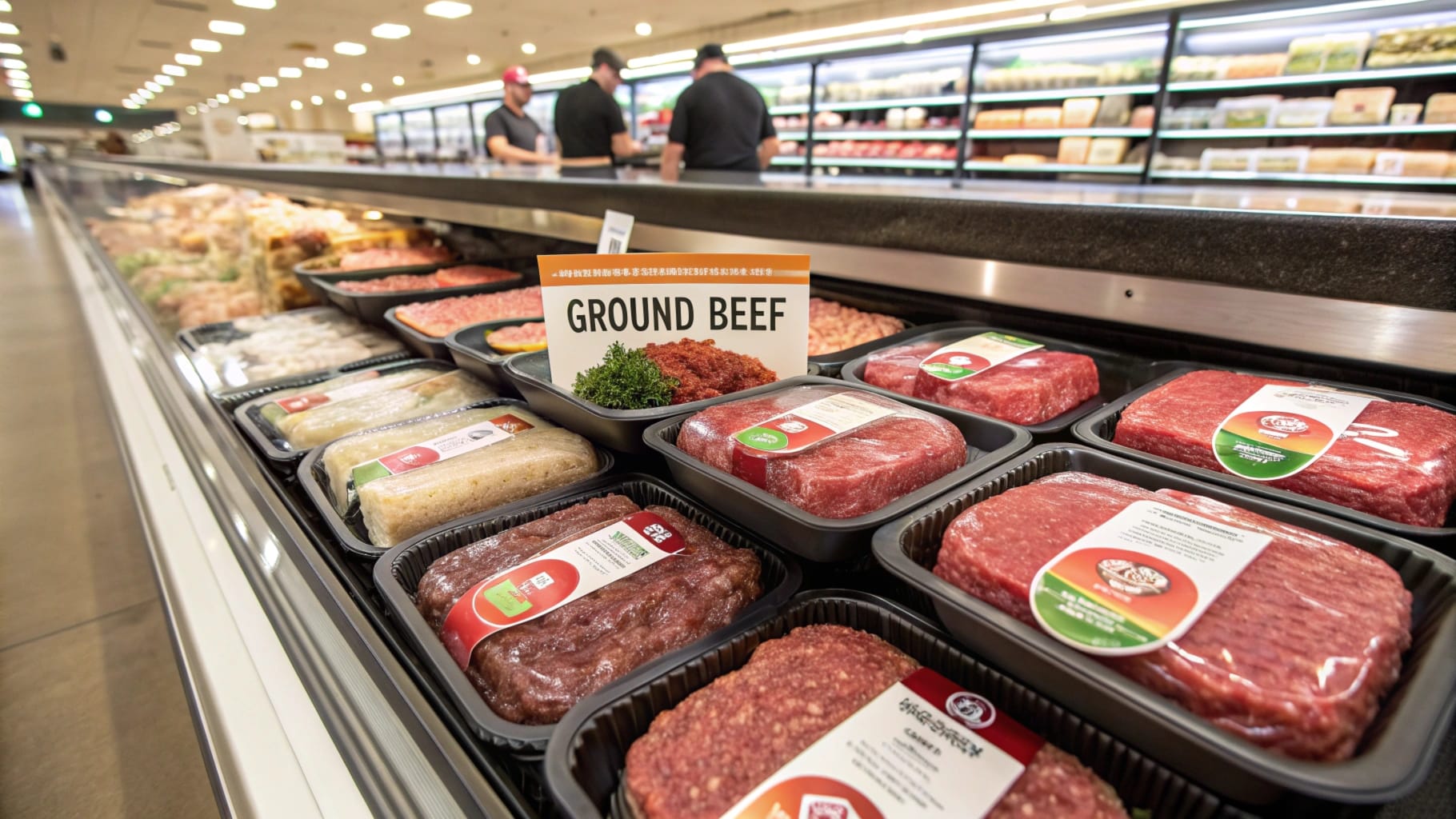When it comes to food safety, ground beef recalls are a significant concern for consumers. Understanding the common problems associated with these recalls and knowing how to respond can help you navigate the complexities of food safety. In this article, we’ll explore what steps to take if you’ve consumed recalled beef, whether all ground beef products are subject to recalls, and tips for ensuring safe consumption.
Introduction to Ground Beef Recalls
What Is a Ground Beef Recall?
A ground beef recall is a safety measure taken by manufacturers when a batch of ground beef is found to be contaminated or mislabeled. This could be due to harmful bacteria like E. coli or Salmonella, or it might involve incorrect labeling that could mislead consumers about the product. When a recall is issued, it’s crucial for consumers to take notice and act accordingly.
Think of it like a fire alarm going off in your home. It’s meant to alert you to danger, and ignoring it could lead to serious consequences.

Importance of Food Safety
Food safety is paramount to ensuring that the food we consume doesn’t make us sick. Ground beef, in particular, can be a breeding ground for bacteria if not handled properly. The Centers for Disease Control and Prevention (CDC) reports that millions of Americans get sick from foodborne illnesses each year. That’s why recalls are an essential part of the food safety system—helping to protect consumers from potentially harmful products.
Imagine biting into a delicious burger only to find out it’s tainted with bacteria. Not a pleasant thought, right? That’s why staying informed about recalls is so important.
Common Reasons for Ground Beef Recalls
Contamination Risks
Ground beef can be contaminated during various stages of production. Here are some common contamination risks:
Bacterial Contaminants: E. coli and Salmonella
E. coli and Salmonella are two of the most notorious bacteria associated with ground beef. E. coli can cause severe stomach cramps, diarrhea, and vomiting, while Salmonella can lead to fever, diarrhea, and abdominal cramps. Both can be especially dangerous for young children, the elderly, and those with weakened immune systems.
“Food safety is not just a personal responsibility; it’s a community responsibility.” – Unknown

Chemical Contaminants
Sometimes, ground beef can be recalled due to chemical contaminants, such as pesticides or other harmful substances. These chemicals can enter the food supply through various means, including improper handling during processing. It’s essential to be aware of these risks, as they can lead to serious health issues.
Mislabeling and Packaging Issues
Another reason for recalls can be mislabeling. This could include incorrect allergen information, wrong expiration dates, or even labeling a product as “organic” when it isn’t. Such errors can lead to severe allergic reactions in sensitive individuals or cause consumers to unknowingly consume expired products.
Imagine you’re allergic to peanuts and you pick up a package of ground beef that’s labeled safe, only to find out it contains peanut traces. It’s a nightmare scenario that recalls aim to prevent.
How to Stay Informed About Ground Beef Recalls
Monitoring FDA and USDA Announcements
The Food and Drug Administration (FDA) and the United States Department of Agriculture (USDA) are the primary agencies responsible for food safety in the U.S. They regularly post updates about recalls on their websites. By checking these sites frequently, you can stay informed about any recalls that may affect the ground beef in your freezer.
Utilizing Online Resources and Apps
In today’s digital age, there are numerous apps and websites designed to help consumers keep track of food recalls. Some popular options include:
- FoodSafety.gov: A comprehensive resource for food safety information, including recalls.
- USDA Food Safety Mobile App: This app provides real-time updates on food recalls and safety alerts.
By leveraging these tools, you can ensure that you’re always in the loop about the safety of your food.
What to Do If You Have Recalled Ground Beef
Identifying Recalled Products
If you hear about a ground beef recall, the first step is to check your fridge or freezer. Look for any packages that match the brand and lot number mentioned in the recall announcement. Most packaging includes a “best by” date or lot number that can help you identify whether your product is affected.

Safe Disposal Practices
If you find that you have recalled ground beef, it’s essential to dispose of it safely. Here are some steps to follow:
- Seal it Up: Place the recalled beef in a sealed bag to prevent any leakage.
- Throw It Away: Dispose of it in your outdoor trash bin, not in your kitchen garbage.
- Clean Up: Make sure to clean any surfaces that the beef may have touched with hot, soapy water.
This helps ensure that you don’t accidentally come into contact with any harmful bacteria.
Health Risks Associated with Contaminated Ground Beef
Symptoms of Foodborne Illness
If you’ve consumed contaminated ground beef, it’s crucial to know the symptoms of foodborne illness. Common signs include:
- Nausea
- Vomiting
- Diarrhea
- Abdominal cramps
- Fever
If you experience any of these symptoms, especially if they’re severe or last more than a couple of days, it’s important to seek medical attention.
Long-term Health Implications
In some cases, foodborne illnesses can lead to long-term health issues. For example, certain strains of E. coli can cause kidney failure, while Salmonella can lead to chronic arthritis. While most people recover without complications, it’s a risk worth taking seriously.
Preventing Ground Beef Contamination at Home
Safe Handling Practices
Preventing contamination starts at home. Here are some safe handling practices to keep in mind:
- Wash Your Hands: Always wash your hands before and after handling raw meat.
- Separate Raw and Cooked Foods: Use different cutting boards for raw meat and other foods to prevent cross-contamination.
- Store Properly: Keep ground beef in the refrigerator if you plan to use it within a couple of days, or freeze it for longer storage.
Proper Cooking Temperatures
Cooking ground beef to the right temperature is crucial. The USDA recommends cooking ground beef to an internal temperature of 160°F (71°C) to kill harmful bacteria. Use a meat thermometer to ensure you’re reaching this temperature.
“Cooking is like love; it should be entered into with abandon or not at all.” – Harriet Van Horne
Common Problems and Solutions
Problem: Uncertainty About Recalls
One of the biggest challenges consumers face is uncertainty about whether their ground beef is safe.
Solution: How to Verify Recalls
To verify recalls, always check the FDA and USDA websites. Additionally, many grocery stores will post recall information in-store or on their websites. If you’re ever in doubt, don’t hesitate to call the store where you purchased the beef.
Problem: Confusion Over Safe Consumption
With so much information available, it can be confusing to know what’s safe to eat and what’s not.
Solution: Guidelines for Safe Beef Consumption
Here are some guidelines to follow:
- Always check for recalls before cooking.
- Follow cooking guidelines to ensure safety.
- If in doubt, throw it out!
Problem: Waste of Food Due to Recalls
It’s frustrating to throw away food, especially when it’s something you planned to enjoy.
Solution: Creative Ways to Use Ground Beef
If you have ground beef that’s not recalled but nearing its expiration, consider creative recipes like:
- Meatballs: Perfect for pasta or sandwiches.
- Chili: A hearty dish that freezes well.
- Tacos: Always a crowd-pleaser!

What Should I Do If I’ve Consumed Recalled Beef?
If you discover that you’ve consumed ground beef that has been recalled, it’s important to take certain steps to ensure your health and safety. Here’s what you should do:
1. Stay Calm and Assess Your Situation
First and foremost, don’t panic. Not everyone who consumes recalled beef will become ill. Many factors determine whether someone will experience symptoms, including the type of bacteria involved, the amount consumed, and individual health conditions.
2. Monitor for Symptoms
Keep an eye out for any symptoms of foodborne illness, which can include:
- Nausea: Feeling sick to your stomach, which may lead to vomiting.
- Diarrhea: This can range from mild to severe and may contain blood in some cases.
- Abdominal Cramps: Pain or discomfort in your stomach area.
- Fever: A mild to moderate fever can occur as your body fights off infection.
Symptoms can appear anywhere from a few hours to several days after consuming contaminated food. If you start experiencing any of these symptoms, it’s essential to take them seriously.
3. Seek Medical Attention if Necessary
If you develop severe symptoms, especially:
- High fever (over 101.5°F or 38.6°C)
- Prolonged vomiting
- Signs of dehydration (such as dry mouth, decreased urination, or dizziness)
- Blood in your stools
You should seek medical help immediately. It’s crucial to inform your healthcare provider that you may have consumed recalled ground beef, as this information can aid in diagnosis and treatment.
4. Keep a Record
If you have consumed recalled beef, it’s helpful to keep a record of:
- The brand and type of ground beef consumed
- The date of consumption
- Any symptoms you experience and when they occur
This information can be beneficial for healthcare professionals and can also be useful if you need to report your experience to health authorities.
5. Report Your Experience
If you become ill after consuming recalled beef, consider reporting your illness to your local health department or the USDA. This helps authorities track outbreaks and prevent others from becoming sick. Reporting can also lead to further investigation into the source of contamination.
6. Stay Informed
Continue to monitor updates about the recall. Sometimes, additional information may be released regarding the specific health risks associated with the contaminated beef. Being informed can help you take necessary precautions.
“An ounce of prevention is worth a pound of cure.” – Benjamin Franklin
Are All Ground Beef Products Subject to Recalls?
Yes, any ground beef product can be subject to recalls, including those from grocery stores, restaurants, and manufacturers. Always check for the latest information.

Nutrition Facts Table
| Nutrient | Amount per 100g |
|---|---|
| Calories | 250 |
| Protein | 26g |
| Total Fat | 20g |
| Saturated Fat | 8g |
| Cholesterol | 80mg |
| Sodium | 75mg |
| Total Carbohydrates | 0g |
| Fiber | 0g |
| Sugars | 0g |
Ingredients for a Basic Ground Beef Recipe
1/2 onion, chopped
1 lb ground beef
1 tsp salt
1/2 tsp black pepper
1 tsp garlic powder
1. Contamination Can Happen Anywhere
Ground beef can become contaminated at any point in the supply chain—from the farm where the cattle are raised to the processing plants and even during packaging and distribution. Factors such as improper handling, unsanitary conditions, or cross-contamination can lead to recalls.
2. Types of Ground Beef Products
Various types of ground beef products can be recalled, including:
- Fresh Ground Beef: This includes any ground beef sold in its raw form at grocery stores or butcher shops.
- Frozen Ground Beef: Even frozen products can be recalled if they are found to be contaminated.
- Pre-packaged Ground Beef: Products that are pre-packaged and labeled, such as patties or meatballs, can also be subject to recalls.
- Bulk Ground Beef: Ground beef sold in bulk at delis or butcher shops is not exempt from recalls.
3. Regulatory Oversight
The USDA and FDA closely monitor food safety and enforce regulations to protect consumers. When contamination is detected, these agencies work quickly to issue recalls to remove unsafe products from the market. This means that even if you buy ground beef from a trusted source, there’s still a chance it could be recalled.
4. Consumer Awareness is Key
It’s essential for consumers to stay aware of recalls, regardless of where they purchase their ground beef. Regularly checking the USDA and FDA websites, signing up for alerts, and keeping an eye on local news can help you stay informed about any recalls that may affect products you have at home.
5. Take Precautions
To minimize the risk of consuming recalled ground beef, always:
- Check for recalls before cooking or consuming ground beef.
- Purchase meat from reputable sources that prioritize food safety.
- Follow safe handling and cooking practices.
By being proactive and informed, you can help protect yourself and your family from the risks associated with ground beef recalls.
Conclusion: Staying Safe with Ground Beef
Ground beef recalls are a serious issue, but by staying informed and following safety guidelines, you can enjoy this versatile ingredient without worry. Remember, food safety is a shared responsibility, and being proactive can help protect you and your loved ones.

FAQs About Ground Beef Recalls
How Can I Report Unsafe Ground Beef?
If you suspect that you’ve encountered unsafe ground beef, you can report it to the USDA or your local health department. They take these reports seriously and will investigate accordingly.

